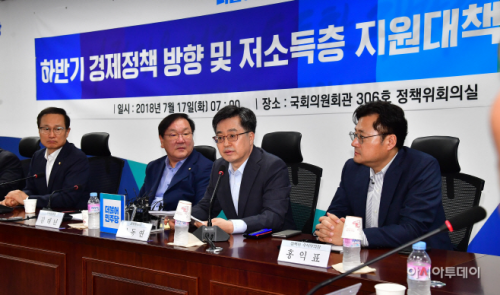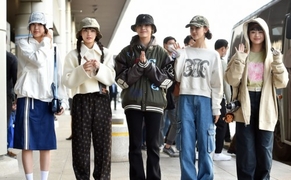 |
| Finance Minister Kim Dong-yeon speaks during a meeting held at the National Assembly to discuss ways to support low-income families on July 17, over a hike in the minimum wage./ Photographed by Jung Jae-hoon. |
AsiaToday reporter Jo Jae-hyung
South Korea's government and the ruling party on Tuesday agreed to expand the beneficiaries of the earned income tax credit (EITC) scheme, a tax refund for low-income families.
They also decided to expand its basic pension program for the elderly that belong to the lower 20 percent income bracket to receive 300,000 won starting next year.
They also plan to announce measures that help the minimum wage increase make a soft landing.
The move seems to be a part of an effort to boost the income-led growth, a key pillar of the Moon Jae-in administration's economic policy, and to revitalize the country's economy.
Officials from the ruling Democratic Party (DP) and the government gathered at the National Assembly on Tuesday to discuss ways to support low-income households before announcing such measures.
First, they decided to expand the range and amount of the EITC to support low-income families and raise their motivation to work.
They decided to increase the current amount of the basic pension to 250,000 won in September this year as planned. Those aged 65 or more and who belong to the lower 20 percent income bracket will receive 300,000 won in basic pension starting next year.
The vocational subsidy for young job seekers will be raised from 300,000 won to 500,000 won, while its maximum period will be expanded from the current three months to six months.
The state allowance for single parents will be increased as well. Until this year, the monthly allowance was cut off once the child turned 15 years old. Starting next year, the monthly allowance will be increased to 170,000 won from the current 130,000 won, and it will be given to all single parents with children aged 18 or younger.
The government and the party also agreed to expand funding for residential and new growth sectors, and vulnerable industries and social groups by reinforcing the finances.
"We will push ahead income-led growth, innovative growth, and fair economy so that inclusive growth will be enhanced in terms of income, employment, and quality of life," said Rep. Kim Tae-nyeon, chief policymaker of the Democratic Party.
Inclusive growth is economic growth that is distributed fairly across society and creates opportunities for all.
The meeting also discussed measures regarding the minimum wage increase. "Although there is a backlash against the minimum wage increase, it is effective in creating a sustainable society that supports vulnerable social groups in our society," said DP floor leader Hong Young-pyo. "The minimum wage increase is one of the policy means of the Moon Jae-in administration's income-led growth and inclusive growth initiatives," Hong added.
"Hiking the minimum wage is the direction that we should go into, but we cannot help paying attention to the various effects on the economy in the second half of the year," said Finance Minister Kim Dong-yeon.
#low-income families #Democratic Party #Moon Jae-in government #minimum wage #inclusive growth
Copyright by Asiatoday
Most Read
-
1
-
2
-
3
-
4
-
5
-
6
-
7





















